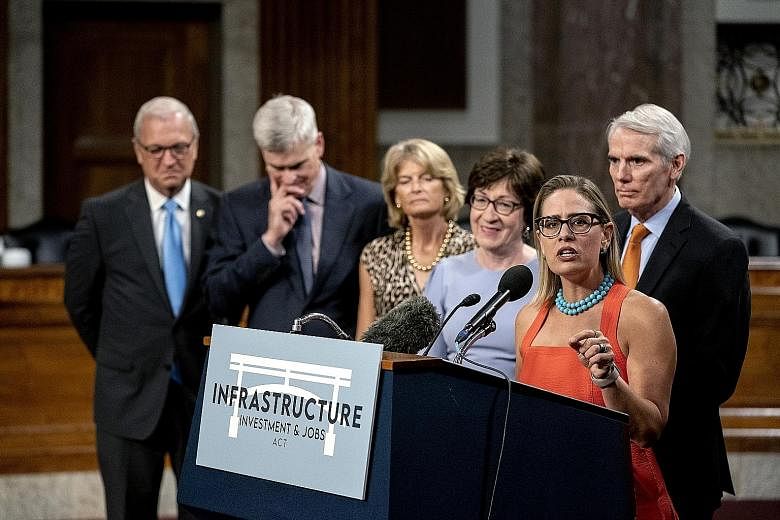WASHINGTON • The United States Senate voted to take up a US$1 trillion (S$1.35 trillion) bipartisan infrastructure Bill that would make far-reaching investments in the nation's public works system, as Republicans joined Democrats in clearing the way for a crucial piece of President Joe Biden's agenda.
The 67-32 vote, which included 17 Republicans in favour, came just hours after centrist senators in both parties and the White House reached a long-sought compromise on the Bill, which would provide about US$550 billion in new federal money for roads, bridges, rail, transit, water and other physical infrastructure programmes.
Among those in support of moving forward was Senator Mitch McConnell of Kentucky, the Senate Republican leader and a long-time foil of major legislation pushed by Democratic presidents. Mr McConnell's backing signalled that his party was - at least for now - open to teaming up with Democrats to enact the plan.
The deal still faces several obstacles to becoming law, including being turned into formal legislative text and clearing final votes in the closely divided Senate and House.
But the vote was a victory for a President who has long promised to break through the partisan gridlock gripping Congress and accomplish big things supported by members of both political parties.
If enacted, the measure would be the largest infusion of federal money into the public works system in more than a decade.
The compromise, which was still being written on Wednesday, includes US$110 billion for roads, bridges and major projects; US$66 billion for passenger and freight rail; US$39 billion for public transit; US$65 billion for broadband; US$17 billion for ports and waterways; and US$46 billion to help states and cities prepare for droughts, wildfires, flooding and other consequences of climate change, according to a White House official who detailed it on condition of anonymity.
In a lengthy statement, President Biden hailed the deal as "the most significant long-term investment in our infrastructure and competitiveness in nearly a century". He also framed it as vindication of his belief in bipartisanship.
"Neither side got everything they wanted in this deal," he said. "But that's what it means to compromise and forge consensus - the heart of democracy. As the deal goes to the entire Senate, there is still plenty of work ahead to bring this home. There will be disagreements to resolve and more compromise to forge along the way."
That was evident on Wednesday even as the President and senators in both parties cheered their agreement.
In negotiating it, Mr Biden and Democratic leaders were forced to agree to concessions, accepting less new federal money for public transit and clean energy projects than they had wanted, including for some electric vehicle charging stations, and abandoning their push for additional funding for tax enforcement at the Internal Revenue Service.
The changes - and the omission of some of their highest priorities - rankled progressives in both chambers, with some threatening to oppose the Bill unless it was modified.
"From what we have heard, having seen no text, this Bill is going to be status quo, 1950s policy with a little tiny add-on," said Representative Peter DeFazio of Oregon, chairman of the Transportation and Infrastructure Committee. "If it's what I think it is, I will be opposed."
Still, the bipartisan compromise was a crucial component of Mr Biden's US$4 trillion economic agenda, which Democrats plan to pair with a US$3.5 trillion budget blueprint that would provide additional spending for climate, healthcare and education, to be muscled through Congress over Republican objections.
"We look forward to moving ahead and having the opportunity to have a healthy debate here in the chamber regarding an incredibly important project for the American people," said Senator Rob Portman, of Ohio, a lead negotiator.
Republicans who negotiated the deal urged their colleagues to support a measure they said would provide badly needed funding for infrastructure projects across the US.
"I am amazed that there are some who oppose this, just because they think that if you ever get anything done, somehow it's a sign of weakness," said Senator Bill Cassidy of Louisiana.
NYTIMES

